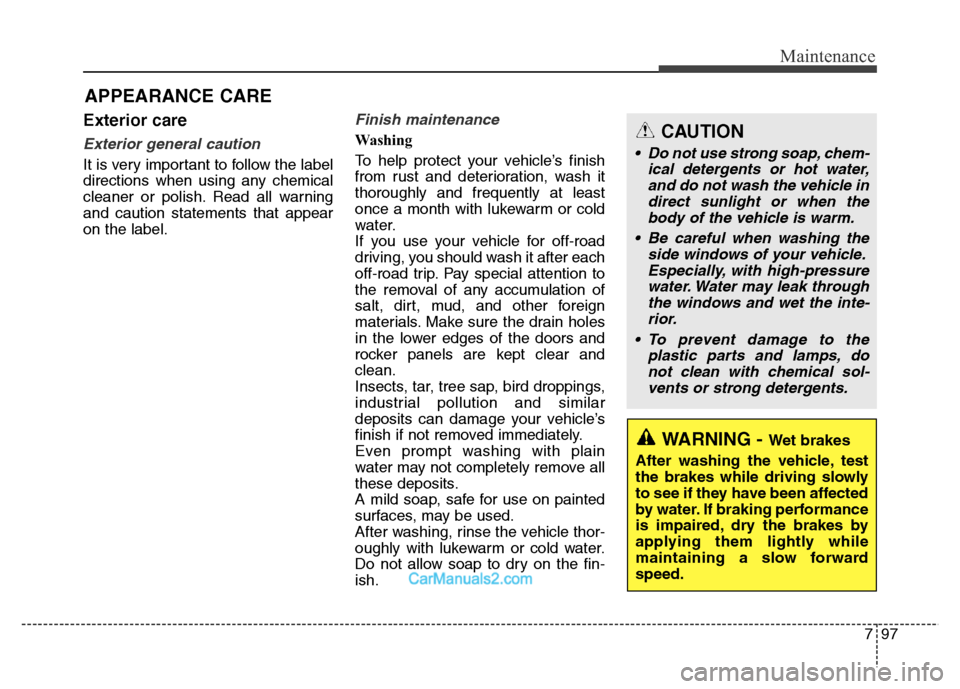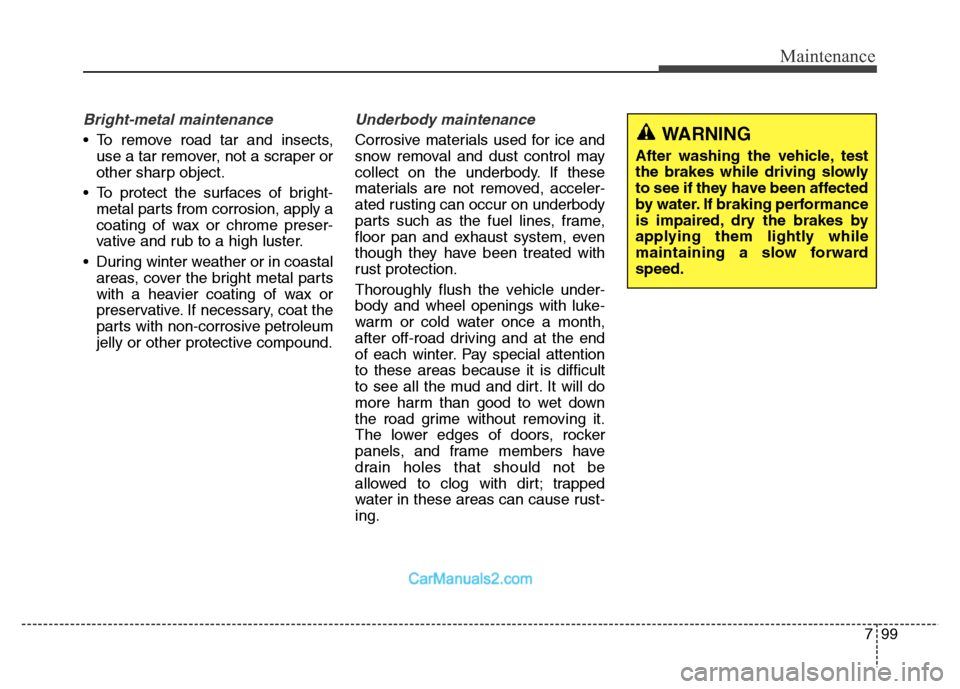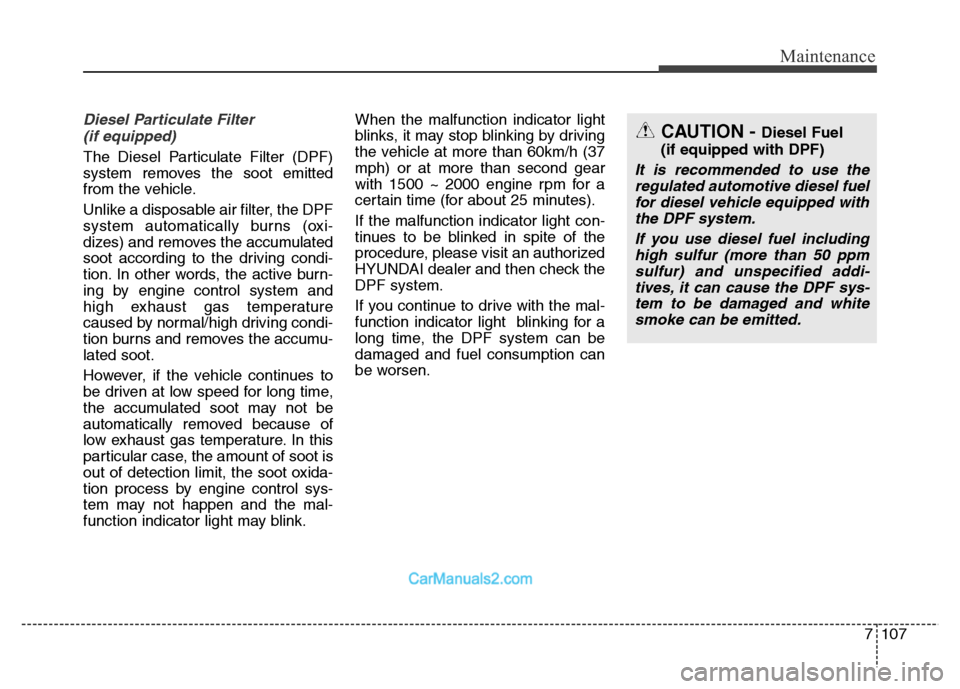Page 667 of 717
Maintenance
86 7
Front fog light aiming
The front fog lamp can be aimed as
the same manner of the head lamps
aiming.
With the front fog lamps and battery
normal condition, aim the front fog
lamps. To aim the front fog lamp up
or down, turn the driver clockwise or
counterclockwise.
ONCEMC3206
Page 671 of 717
Maintenance
90 7
ONCEMC3209
Front fog light
1. Turn the front fog lamp on with the driver (75 kg) aboard.
2. The cut-off line should be projected in the allowable range (shaded region).
■Based on 3m screen
Page 672 of 717
791
Maintenance
Side repeater lamp replace-
ment
If the light bulb does not operate, we
recommend that the system be
checked by an authorized HYUNDAI
dealer.
Rear combination lamp bulb
replacement
(1) Rear turn signal lamp
(2) Back-up lamp
(3) Tail/stop lamp
(4) Tail lamp (Bulb), Tail/stop lamp
(LED)
Outside lamp
Rear turn signal lamp and stop/tail
lamp
1. Turn off the engine.
2. Open the tailgate.
3. Loosen the lamp assembly retain-
ing screws with a cross-tip screw-
driver.
4. Remove the rear combination
lamp assembly from the body of
the vehicle.
ONCEMC3214ONCNMC2037
Page 676 of 717
795
Maintenance
License plate lamp bulb
replacement
1. Loosen the lens retaining screws
with a philips head screwdriver.
2. Remove the lens.
3. Remove the bulb by pulling it
straight out.
4. Install a new bulb.
5. Reinstall the lens securely with the
lens retaining screws.
Door courtesy lamp bulb
replacement (if equipped)
If the light bulb does not operate, we
recommend that the vehicle be
checked by an authorized HYUNDAI
dealer.
ODM042261ODM072039
Page 678 of 717

797
Maintenance
APPEARANCE CARE
Exterior care
Exterior general caution
It is very important to follow the label
directions when using any chemical
cleaner or polish. Read all warning
and caution statements that appear
on the label.
Finish maintenance
Washing
To help protect your vehicle’s finish
from rust and deterioration, wash it
thoroughly and frequently at least
once a month with lukewarm or cold
water.
If you use your vehicle for off-road
driving, you should wash it after each
off-road trip. Pay special attention to
the removal of any accumulation of
salt, dirt, mud, and other foreign
materials. Make sure the drain holes
in the lower edges of the doors and
rocker panels are kept clear and
clean.
Insects, tar, tree sap, bird droppings,
industrial pollution and similar
deposits can damage your vehicle’s
finish if not removed immediately.
Even prompt washing with plain
water may not completely remove all
these deposits.
A mild soap, safe for use on painted
surfaces, may be used.
After washing, rinse the vehicle thor-
oughly with lukewarm or cold water.
Do not allow soap to dry on the fin-
ish.
WARNING - Wet brakes
After washing the vehicle, test
the brakes while driving slowly
to see if they have been affected
by water. If braking performance
is impaired, dry the brakes by
applying them lightly while
maintaining a slow forward
speed.
CAUTION
• Do not use strong soap, chem-
ical detergents or hot water,
and do not wash the vehicle in
direct sunlight or when the
body of the vehicle is warm.
• Be careful when washing the
side windows of your vehicle.
Especially, with high-pressure
water. Water may leak through
the windows and wet the inte-
rior.
• To prevent damage to the
plastic parts and lamps, do
not clean with chemical sol-
vents or strong detergents.
Page 680 of 717

799
Maintenance
Bright-metal maintenance
• To remove road tar and insects,
use a tar remover, not a scraper or
other sharp object.
• To protect the surfaces of bright-
metal parts from corrosion, apply a
coating of wax or chrome preser-
vative and rub to a high luster.
• During winter weather or in coastal
areas, cover the bright metal parts
with a heavier coating of wax or
preservative. If necessary, coat the
parts with non-corrosive petroleum
jelly or other protective compound.
Underbody maintenance
Corrosive materials used for ice and
snow removal and dust control may
collect on the underbody. If these
materials are not removed, acceler-
ated rusting can occur on underbody
parts such as the fuel lines, frame,
floor pan and exhaust system, even
though they have been treated with
rust protection.
Thoroughly flush the vehicle under-
body and wheel openings with luke-
warm or cold water once a month,
after off-road driving and at the end
of each winter. Pay special attention
to these areas because it is difficult
to see all the mud and dirt. It will do
more harm than good to wet down
the road grime without removing it.
The lower edges of doors, rocker
panels, and frame members have
drain holes that should not be
allowed to clog with dirt; trapped
water in these areas can cause rust-
ing.WARNING
After washing the vehicle, test
the brakes while driving slowly
to see if they have been affected
by water. If braking performance
is impaired, dry the brakes by
applying them lightly while
maintaining a slow forward
speed.
Page 688 of 717

7107
Maintenance
Diesel Particulate Filter
(if equipped)
The Diesel Particulate Filter (DPF)
system removes the soot emitted
from the vehicle.
Unlike a disposable air filter, the DPF
system automatically burns (oxi-
dizes) and removes the accumulated
soot according to the driving condi-
tion. In other words, the active burn-
ing by engine control system and
high exhaust gas temperature
caused by normal/high driving condi-
tion burns and removes the accumu-
lated soot.
However, if the vehicle continues to
be driven at low speed for long time,
the accumulated soot may not be
automatically removed because of
low exhaust gas temperature. In this
particular case, the amount of soot is
out of detection limit, the soot oxida-
tion process by engine control sys-
tem may not happen and the mal-
function indicator light may blink.When the malfunction indicator light
blinks, it may stop blinking by driving
the vehicle at more than 60km/h (37
mph) or at more than second gear
with 1500 ~ 2000 engine rpm for a
certain time (for about 25 minutes).
If the malfunction indicator light con-
tinues to be blinked in spite of the
procedure, please visit an authorized
HYUNDAI dealer and then check the
DPF system.
If you continue to drive with the mal-
function indicator light blinking for a
long time, the DPF system can be
damaged and fuel consumption can
be worsen.
CAUTION - Diesel Fuel
(if equipped with DPF)
It is recommended to use the
regulated automotive diesel fuel
for diesel vehicle equipped with
the DPF system.
If you use diesel fuel including
high sulfur (more than 50 ppm
sulfur) and unspecified addi-
tives, it can cause the DPF sys-
tem to be damaged and white
smoke can be emitted.
Page 691 of 717
83
Specifications & Consumer information
BULB WATTAGE
* If equipped
Light Bulb Wattage Bulb type
FrontHeadlights(Low) 55 or 35(HID) * H7L or D3S
Headlights(High) 55 H7L
Front turn signal lamps 21 PY21W
Front position lights 5 or LED W5W or LED
Front fog lights * 35 H8
Side Repeater lamps (Outside Mirror) LED LED
Daytime running lights * LED LED
RearRear fog lights * 21 P21W
Rear Stop/Tail lights (outside) 21/5, LED P21/5W, LED
Rear tail lights (Inside) 8 W8W
Rear Stop/Tail lights (Inside) LED LED
Rear turn signal lights 21 PY21W
Back-up lights 16 W16W
High mounted stop light LED LED
License plate lights 5 W5W
InteriorMap lamps 10 FESTOON
Room lamps 8 FESTOON
Vanity mirror lamps 5 FESTOON
Glove box lamp 5 FESTOON
Door courtesy lamps 5 FESTOON
Luggage lamp 5 FESTOON